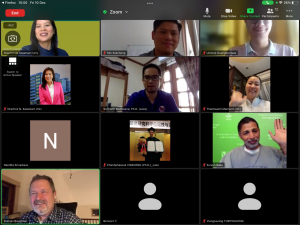
(This picture was taken at a virtual event as part of the ongoing Innovation Lab for Food Security Policy Research, Capacity, and Influence (PRCI) project)
Travel restrictions and safety regulations due to COVID-19 compelled IFPRI researchers to conduct Capacity Strengthening (CS) activities using virtual approaches for learning and engagement. As part of the shift from in-person training to virtual mode, IFPRI researchers are developing effective pedagogical approaches for building skills and reaching out to larger groups of policy analysts and policy makers. This blog series includes five blog posts on ''Conducting Virtual Training during COVID-19: Experience of IFPRI Researchers'. It provides the experiences of IFPRI researchers on conducting virtual CS activities during the pandemic with focus on key challenges, lessons learnt, best practices, and the way forward. The links for the five blogs are provided below:
Best Practices and Lessons from Virtual Training on ‘Using Household Data for Policy Analysis
Highpoints and Hiccups: Virtual Capacity Strengthening in the Time of Covid-19
Best Practices and Lessons from Virtual Training on ‘Trade Flow Analysis’
Capacity building training through virtual model in India – challenges and opportunities
Delivering capacity strengthening virtually during COVID-19: Lessons from Nigeria
The key takeaways from the blogs and IFPRI’s RISE 2021 session on “Can virtual approaches achieve capacity strengthening (CS) goals?” have been used as a basis for developing a set of virtual training guidelines. These guidelines provide best practices which can be utilized when organizing and delivering capacity strengthening activities depending on the nature and scale of the programs implemented.
The guidelines can be accessed here.